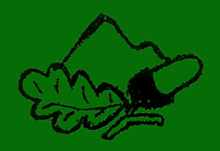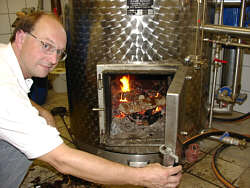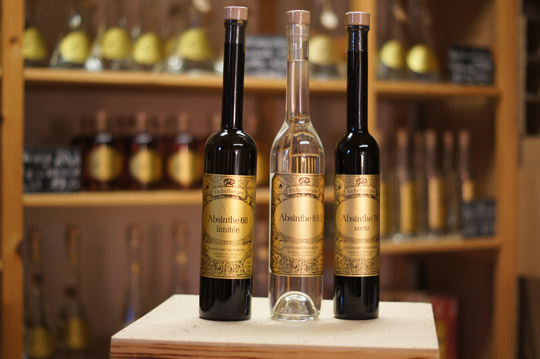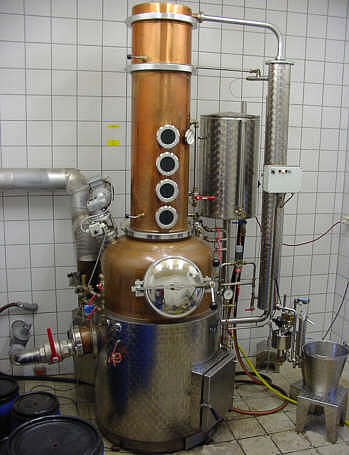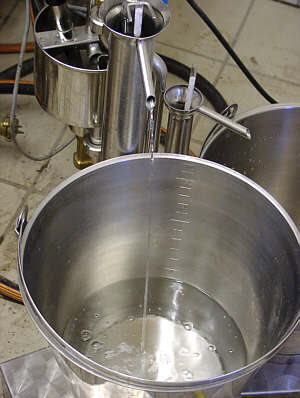Authentic absinthe is still a relative rarity in Germany. Many German producers rely on cost-saving and inauthentic production methods - oil mixtures, artificial colorings, and omission of critical flavor components. The small distillery "Eichelberger Spezialitäten" in Bavarian Bodenwöhr is one exception. This family business, founded by Lili and Rudolf Wild, produces a wide selection of different spirits. Fruit brandies, whiskey, vodka, fruit liqueurs, and of course a varying selection of absinthes constitute the greatest part of their assortment. Despite this impressive product range, the Wild couple does not employ a big team for their production processes.
The distillery Eichelberger Brennerei is a family business, conducted by my husband Rudolf and I as a side business. We ourselves therefore fill all the positions that such a company requires.
Lili Wild describes the history of the distillery. The fruit farm of Wild's parents served as the original base for the company:
Our overtaking of the small farming business of our parents included a farming plot with roughly 50 different fruit trees. They formed the base for our Eichelberger distillery, with operations starting in 1998 with new, high-grade distilling equipment. Since then, we have transformed further pastures and fields into fruit orchards and raised our tree population to approximately 400 trees. Our orchards have eco-certification, so many of our products carry the eco-seal. The assortment of fruit brandies has grown annually. Furthermore, different absinthes, brandies, whisky and vodka have been produced here since 2005. Our current newest product is a gin with eco-seal. We started producing absinthes only after the lift of the European ban. They are our bestselling products - alongside our classic fruit brandies such as pear, raspberry, and sloe brandies - and are demanded worldwide.
Today, the Wild couple also operates a honey farm with about 30 bee colonies. They sell all their products, including the honey, in their small village store.
The assortment
The absinthes are produced and categorized in alcohol concentrations from 58% to 83,2%. The flavor profiles vary due to different recipes, thus appealing to different tastes.
The production
The worldwide popularity of Eichelberger absinthes is rather unusual for such a small distillery. One reason is probably the employment of artisinal, traditional production methods, which do not need to shy away from comparison to international competition:
Absinthes are made from herbal mixtures that are soaked in high-proof pure alcohol, left for maceration for some time, and subsequently slowly distilled (slow distillation equals flavor-preserving). The two most important herbs are anise as the main flavor component, and wormwood (lat. Artemisia Absinthium), from which absinthe gets its name. Further herbs can be added according to the desired flavor profile. In this way, absinthe can have strong herbal or sweet fruity flavors.
The path to absinthe production was rather unconventional for the Eichelberger distillery. While producers usually utilize their own recipes, which often don't meet high quality standards because of the use of cheap ingredients and production methods, the Eichelberger distillery was inspired by experts, who did not consider economical factors:
The initial trigger for the production of our first absinthe in 2003 was an article in the "Wirtschaftswoche" regarding the absinthe ban and its lifting in 1997. In 2005 a group of young absintheurs conducted a competition with the motto "Who can create the best authentic absinthe?". After the experts decided on a recipe, we as the trusted distillery were tasked with the implementation, and we produced a limited edition of the absinthe 68 limitée, which is still part of our assortment. We therefore carry authentic absinthes like the absinthe 68 limitée and the absinthe 60 verte (with eco-seal). But of course we also produce absinthe with new flavour profiles for our modern customers who are eager to try new things, like the absinthe 80 brute.
This deviation from tradition should however not be understood as a full break with authenticity. Rather, new flavour profiles are achieved by carefully varying the selection and amounts of herbs, so the end result is always a high quality distilled spirit, aromatized by wholly natural botanicals:
Whoever is interested in absinthe will soon realize the wide range of possibilities for the combinations of different herbs for a round, always new flavour profile. Absinthe is a drink for creative people.
With production quality at this level, it's an unavoidable side-effect that lower quality competitive products are often sold at a lower price.
Absinthes are always marketed as high-proof products, diluted only right before serving. We offer our absinthes with an alcohol content ranging from 58% to 83,2%. The major part of the retail price is therefore the brandy tax. Additionally, if you value good herbs, perhaps from organic farming, and conduct the distillation as a time-intensive, flavor-preserving process, the retail price must stay at a high level.
Marketing according to tradition
The authenticity of absinthe of course does not end with the production. The culture of preparing and enjoying the drink has its own tradition, which is still appreciated by absintheurs.
Absintheurs love the special ritual of drinking absinthe: serving the absinthe, diluting it with ice water to an alcoholic strength of 20-25%, and observing the white clouding. Usually only this one glass is slowly emptied.
Modern marketing from dubious producers of faux absinthes has led to wide-spread customs and misconceptions that don't hold up to scrutiny. The belief that the chemical agent thujone, which can be found in absinthe, has a recreational psychedelic drug-like effect, has contributed to absinthe's dubious reputation, which has only recently begun to be repaired. In contrast, the customers of small specialized distilleries are usually better informed.
The group of customers that demands an intoxicative effect that goes beyond the alcohol-herbs-enjoyment is, by my own estimation, negligibly small. Our absinthes therefore contain very small amounts of thujone, which are far lower than the legal requirements.
The German absinthe culture lags generally behind current developments, as is evident in the popularity of modern preparation methods, which are widely frowned upon in France and Switzerland. Eichelberger absinthes fall into a product class which does not require spectacular marketing to hide qualitative faultiness. All that's now missing is the educated consumer consciousness of the German customer.
Our absinthes are very mild and contain above-average amounts of anise. This results in a pleasant natural sweetness, so that sweetening with a sugar cube and flaming the doused sugar is unnecessary, if all you're looking for is the flavour experience. One should however not underestimate the effect of fire in absinthe advertising.
